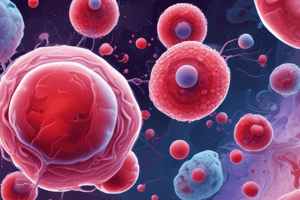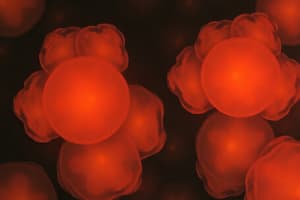Podcast
Questions and Answers
What percentage of WBC in blood do polymorphonuclear leukocytes make up?
What percentage of WBC in blood do polymorphonuclear leukocytes make up?
- 80%
- 60%
- 70% (correct)
- 50%
Which type of leukocytes are the first cells to arrive at a site of inflammation?
Which type of leukocytes are the first cells to arrive at a site of inflammation?
- Eosinophils
- Basophils
- Lymphocytes
- Neutrophils (correct)
What do neutrophils contain in their granules?
What do neutrophils contain in their granules?
- Digestive enzymes
- Bactericidal proteins (correct)
- Histamine
- Cytokines
What do neutrophils mainly attack?
What do neutrophils mainly attack?
What is the lifespan of neutrophils?
What is the lifespan of neutrophils?
What can the formation of pus caused by killed bacteria and neutrophils lead to?
What can the formation of pus caused by killed bacteria and neutrophils lead to?
What do neutrophils secrete that recruit more immune cells?
What do neutrophils secrete that recruit more immune cells?
What condition occurs during acute bacterial infections?
What condition occurs during acute bacterial infections?
What is the cause of neutrophilia?
What is the cause of neutrophilia?
What is the function of neutrophils in attacking bacteria?
What is the function of neutrophils in attacking bacteria?
What is the size of polymorphonuclear leukocytes?
What is the size of polymorphonuclear leukocytes?
Which type of leukocytes contain histamine in their granules?
Which type of leukocytes contain histamine in their granules?
Flashcards are hidden until you start studying
Study Notes
- Polymorphonuclear leukocytes are 12µm and make up 70% of WBC in blood.
- Neutrophils contain granules with bactericidal proteins.
- Neutrophils are the first cells to arrive at a site of inflammation.
- Neutrophils attack bacteria and secrete toxic chemicals.
- Neutrophils have a short lifespan of approximately 1 day.
- Killed bacteria and neutrophils form pus which can cause damage to healthy tissue.
- Neutrophils secrete inflammatory mediators that recruit more immune cells.
- Neutrophilia occurs during acute bacterial infections.
- Neutrophilia is due to increased mobilization and production of G-CSF.
- Neutrophils mainly attack antibody-labeled bacteria.
Studying That Suits You
Use AI to generate personalized quizzes and flashcards to suit your learning preferences.




